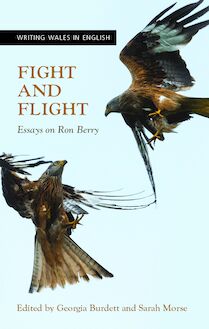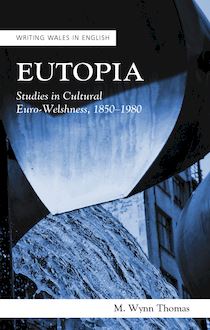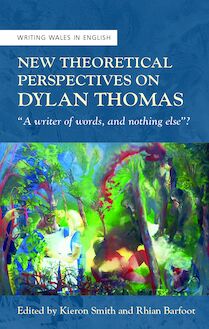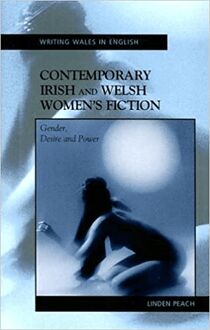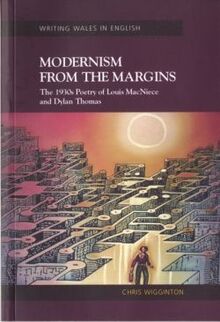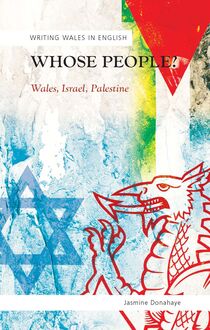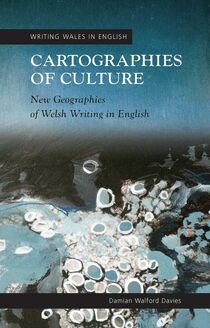Locating Lynette Roberts , livre ebook
258
pages
English
Ebooks
2019
Obtenez un accès à la bibliothèque pour le consulter en ligne En savoir plus
Découvre YouScribe en t'inscrivant gratuitement
Découvre YouScribe en t'inscrivant gratuitement
258
pages
English
Ebooks
2019
Obtenez un accès à la bibliothèque pour le consulter en ligne En savoir plus
Publié par
Date de parution
01 avril 2019
Nombre de lectures
0
EAN13
9781786833839
Langue
English
Poids de l'ouvrage
2 Mo
Lynette Roberts is an extraordinary modernist poet and novelist, with her vivid imagery and restless experimentalism. Her writing displays a kind of double longing – for Wales, and for the Argentina she left behind. Her poetry constantly moves between the colours, mythologies and landscapes of the two countries and, in so doing, poses a series of important questions: where, and what, is home? How do we inhabit a particular time and place? This volume of essays brings together for the first time some of the most important research on Roberts’s work that has emerged since the landmark republication of her Collected Poems in 2005. Written by a range of prominent scholars, writers and poets, each essay strives in some way to ‘place’ Roberts, analysing the environments to which her writing responds and teasing out the interwoven skeins of her national, cultural and political affiliations. Together, they pinpoint key concerns in Roberts’s elusive, haunting work, and define her original contribution to twentieth-century literary culture.
Notes on Contributors
Acknowledgments
Introduction: Locating Lynette Roberts: ‘always observant and slightly obscure’- Siriol McAvoy
1. The Scarlet Woman - M. Wynn Thomas
2. ‘“You have a Welsh name, are you Welsh?’ he asked. ‘I don’t know,’ I replied”’: Lynette Roberts and Elective Welsh Identity - Katie Gramich
3. ‘I remember these things’: Memory, Misrepresentation and Cultural Tradition in Lynette Roberts’s Seven Stories - Michelle Deininger
4. ‘What changes break before us’: Semi-Peripheral Modernity in Lynette Roberts’s Poetry and Prose - Andrew Webb
5. Welsh Literary Modernism, Lynette Roberts, and David Jones: Unearthing ‘a huge and very important culture’ - Daniel Hughes
6. ‘Crusaders uncross limbs by green light of flares’: Lynette Roberts’s Avant-Garde Medievalism - Siriol McAvoy
7. Burnt Pain and Blasted Seashells: Lynette Roberts’s Estuarine War Writing - Leo Mellor
8. Listening and Location in the Poetry of Lynette Roberts - Zoë Skoulding
9. Lynette Roberts’s The Endeavour: A Generic Adventure - Charles Mundye
Select Bibliography
Index
Publié par
Date de parution
01 avril 2019
Nombre de lectures
0
EAN13
9781786833839
Langue
English
Poids de l'ouvrage
2 Mo
Locating Lynette Roberts
WRITING WALES IN ENGLISH
LLR.indd 1 12/03/2019 10:15:20CREW series of Critical and Scholarly Studies
General Editors: Kirsti Bohata and Daniel G. Williams (CREW, Swansea
University)
This CREW series is dedicated to Emyr Humphreys, a major fgure in the literary
culture of modern Wales, a founding patron of the Centre for Research into the
English Literature and Language of Wales. Grateful thanks are due to the late
Richard Dynevor for making this series possible.
Other titles in the series
Stephen Knight, A Hundred Years of Fiction (978-0-7083-1846-1)
Barbara Prys-Williams, Twentieth-Century Autobiography (978-0-7083-1891-1)
Kirsti Bohata, Postcolonialism Revisited (978-0-7083-1892-8)
Chris Wigginton, Modernism from the Margins (978-0-7083-1927-7)
Linden Peach, Contemporary Irish and Welsh Women’s Fiction (978-0-7083-1998-7)
Sarah Prescott, Eighteenth-Century Writing from Wales: Bards and Britons
(978-0-7083-2053-2)
Hywel Dix, After Raymond Williams: Cultural Materialism and the Break-Up of Britain
(978-0-7083-2153-9)
Matthew Jarvis, Welsh Environments in Contemporary Welsh Poetry (978-0-7083-2152-2)
Harri Garrod Roberts, Embodying Identity: Representations of the Body in Welsh
Literature (978-0-7083-2169-0)
Diane Green, Emyr Humphreys: A Postcolonial Novelist (978-0-7083-2217-8)
M. Wynn Thomas, In the Shadow of the Pulpit: Literature and Nonconformist Wales
(978-0-7083-2225-3)
Linden Peach, The Fiction of Emyr Humphreys: Contemporary Critical Perspectives
(978-0-7083-2216-1)
Daniel Westover, R. S. Thomas: A Stylistic Biography (978-0-7083-2413-4)
Jasmine Donahaye, Whose People? Wales, Israel, Palestine (978-0-7083-2483-7)
Judy Kendall, Edward Thomas: The Origins of His Poetry (978-0-7083-2403-5)
Damian Walford Davies, Cartographies of Culture: New Geographies of Welsh Writing
in English (978-0-7083-2476-9)
Daniel G. Williams, Black Skin, Blue Books: African Americans and Wales 1845–1945
(978-0-7083-1987-1)
Andrew Webb, Edward Thomas and World Literary Studies: Wales, Anglocentrism and
English Literature (978-0-7083-2622-0)
Alyce von Rothkirch, J. O. Francis, realist drama and ethics: Culture, place and nation
(978-1-7831-6070-9)
Rhian Barfoot, Liberating Dylan Thomas: Rescuing a Poet from Psycho-Sexual
Servitude (978-1-7831-6184-3)
Daniel G. Williams, Wales Unchained: Literature, Politics and Identity in the American
Century (978-1-7831-6212-3)
M. Wynn Thomas, The Nations of Wales 1890–1914 (978-1-78316-837-8)
Richard McLauchlan, Saturday’s Silence: R. S. Thomas and Paschal Reading
(978-1-7831-6920-7)
Bethan M. Jenkins, Between Wales and England: Anglophone Welsh Writing of the
Eighteenth Century (978-1-7868-3029-6)
M. Wynn Thomas, All that is Wales: The Collected Essays of M. Wynn Thomas
(978-1-7868-3088-3)
Laura Wainwright, New Territories in Modernism: Anglophone Welsh Writing,
1930–1949 (978-1-7868-3217-7)
LLR.indd 2 12/03/2019 10:15:20Locating
Lynette Roberts
‘Always Observant and
Slightly Obscure’
WRITING WALES IN ENGLISH
Edited by Siriol McAvoy
UNIVERSITY OF WALES PRESS
2019
LLR.indd 3 12/03/2019 10:15:20© The Contributors, 2019
All rights reserved. No part of this book may be reproduced in any
material form (including photocopying or storing it in any medium
by electronic means and whether or not transiently or incidentally to
some other use of this publication) without the written permission
of the copyright owner. Applications for the copyright owner’s
written permission to reproduce any part of this publication should
be addressed to the University of Wales Press, University Registry,
King Edward VII Avenue, Cardiff CF10 3NS.
www.uwp.co.uk
British Library CIP Data
A catalogue record for this book is available from the British Library.
ISBN: 978-1-78683-382-2
e-ISBN: 978-1-78683-383-9
The right of The Contributors to be identifed as authors of this
work has been asserted in accordance with sections 77 and 79 of the
Copyright, Designs and Patents Act 1988.
Typeset by Marie Doherty
Printed by CPI Antony Rowe, Melksham
LLR.indd 4 12/03/2019 10:15:20Contents
Series Editors’ Preface vii
Notes on Contributors ix
Acknowledgements xi
Introduction: Locating Lynette Roberts: ‘Always observant 1
and slightly obscure’
Siriol McAvoy
1 The Scarlet Woman 23
M. Wynn Thomas
2 ‘ “You have a Welsh name, are you Welsh?” he asked. 47
“I don’t know,” I replied’: Lynette Roberts and
Elective Welsh Identity
Katie Gramich
3 ‘I remember these things’: Memory, Misrepresentation 67
and Cultural Tradition in Lynette Roberts’s
‘Seven Stories’
Michelle Deininger
4 ‘What changes break before us’: Semi-peripheral 85
Modernity in Lynette Roberts’s Poetry and Prose
Andrew Webb
LLR.indd 5 12/03/2019 10:15:20vi Contents
5 Welsh Literary Modernism, Lynette Roberts and 101
David Jones: Unearthing ‘a huge and very
important culture’
Daniel Hughes
6 ‘Crusaders uncross limbs by the green light of fares’: 121
Lynette Roberts’s Avant-garde Medievalism
Siriol McAvoy
7 Burnt Pain and Blasted Seashells: Lynette Roberts’s 155
Estuarine War Writing
Leo Mellor
8 Listening and Location in the Poetry of Lynette Roberts 177
Zoë Skoulding
9 Lynette Roberts’s The Endeavour: a Generic Adventure 197
Charles Mundye
Select Bibliography 219
Index 233
LLR.indd 6 12/03/2019 10:15:20series editors’ Preface
The aim of this series, since its founding in 2004 by Professor M.
Wynn Thomas, is to publish scholarly and critical work by established
specialists and younger scholars that refects the richness and var -
iety of the English-language literature of modern Wales. The studies
published so far have amply demonstrated that concepts, models and
discourses current in the best contemporary studies can illuminate
aspects of Welsh culture, and have also foregrounded the potential
of the Welsh example to draw attention to themes that are often
neglected or marginalised in anglophone cultural studies. The series
defnes and explores that which distinguishes Wales’s anglophone
literature, challenges critics to develop methods and approaches
adequate to the task of interpreting Welsh culture, and invites its
readers to locate the process of writing Wales in English within
comparative and transnational contexts.
Professor Kirsti Bohata and Professor Daniel G. Williams
Founding Editor: Professor M. Wynn Thomas (2004–15)
CREW (Centre for Research into the English
Literature and Language of Wales)
Swansea University
LLR.indd 7 12/03/2019 10:15:21This page is intentionally left blank
LLR.indd 8 12/03/2019 10:15:21Contributors
Michelle Deininger is Lecturer and Co-ordinator of the Humanities
provision at the Department of Continuing and Professional
Education, Cardiff University. Her interests include Welsh
women’s short stories in English from the mid-nineteenth century to the
present. She has recently published an essay on ecofeminism in
contemporary Welsh women’s writing, and is preparing (with Claire
Flay-Petty) a major monograph on women, writing and higher
education in twentieth-century culture.
Katie Gramich is Professor of English Literature at Cardiff University.
Her research has focused on rediscovering Welsh women writers. She
has edited texts by Allen Raine, Amy Dillwyn, and Eiluned Lewis and
co-edited a wide-ranging anthology of Welsh women’s poetry for the
Honno Classics series. Her monographs include Twentieth-Century
Women’s Writing in Wales: Land, Gender, Belonging (UWP) and Kate
Roberts (UWP). Broadview Press published her new edition and
translation of the poetry of the late medieval Welsh woman poet
Gwerful Mechain in 2018.
Daniel Hughes is lecturer in modern and contemporary literature at
Bangor University. His work has been published in Wales Arts Review
and The International Journal of Welsh Writing in English. Daniel is
preparing a monograph on anglophone Welsh modernism, as well
as a co-authored monograph (with Tomos Owen), on the poet, critic
and translator Tony Conran.
LLR.indd 9 12/03/2019 10:15:21x Contributors
Siriol McAvoy is a writer and literary researcher. She teaches in the
Department of Continuing and Professional Education, Cardiff
University. An Honorary Research Fellow in CREW, Swansea
University, she is also co-chair of Modernist Network Cymru. She
completed a PhD at Cardiff University in 2017, and her current
research projects focus on Anglophone Welsh poetry of the 1940s
and 1950s and twentieth-century women’s writing.
Leo Mellor is the Roma Gill Fellow in English and Director of Studies
at Murray Edwards College, the University of Cambridge. He has
published widely on modernism and twentieth-century literature, and
is the author of Reading the Ruins: Bombsites, Modernism and British
Culture (Cambridge University Press, 2011).
Charles Mundye is President of the Robert Graves Society and Fellow
of the English Association. He is the editor of Keidrych Rhys’s The
Van Pool: Collected Poems (Seren, 2012), and Robert Graves’s War
Poems (Seren, 2016). He is currently Deputy Head and Head of
Academic Development in the Department of Humanities at Sheffeld
Hallam University.
Zoë Skoulding is a poet and Reader at Bangor University. She has
published several volumes of poetry including The Museum of
Disappearing Sounds (Seren, 2013), and a monograph, Experimental
Cities: Contemporary Women’s Poetry and Urban Space (Palgrave
Macmillan, 2013).
Professor M. Wynn Thomas holds the Emyr Humphreys Chair of
Welsh Writing in English at Swansea University, and is the former
Director and founder of CREW, the Centre for Research into the
English Literature and Language of Wales. A Fellow of the British
Academy and the Learned Society of Wales, he has published over
twenty books on American poetry and on the two literatures of Wales.
In 2018 he won the Wales Book of the Year Award for creative
nonfction with his essay collection, All That is Wales.
Andrew Webb is Senior Lecturer in Welsh Wr


